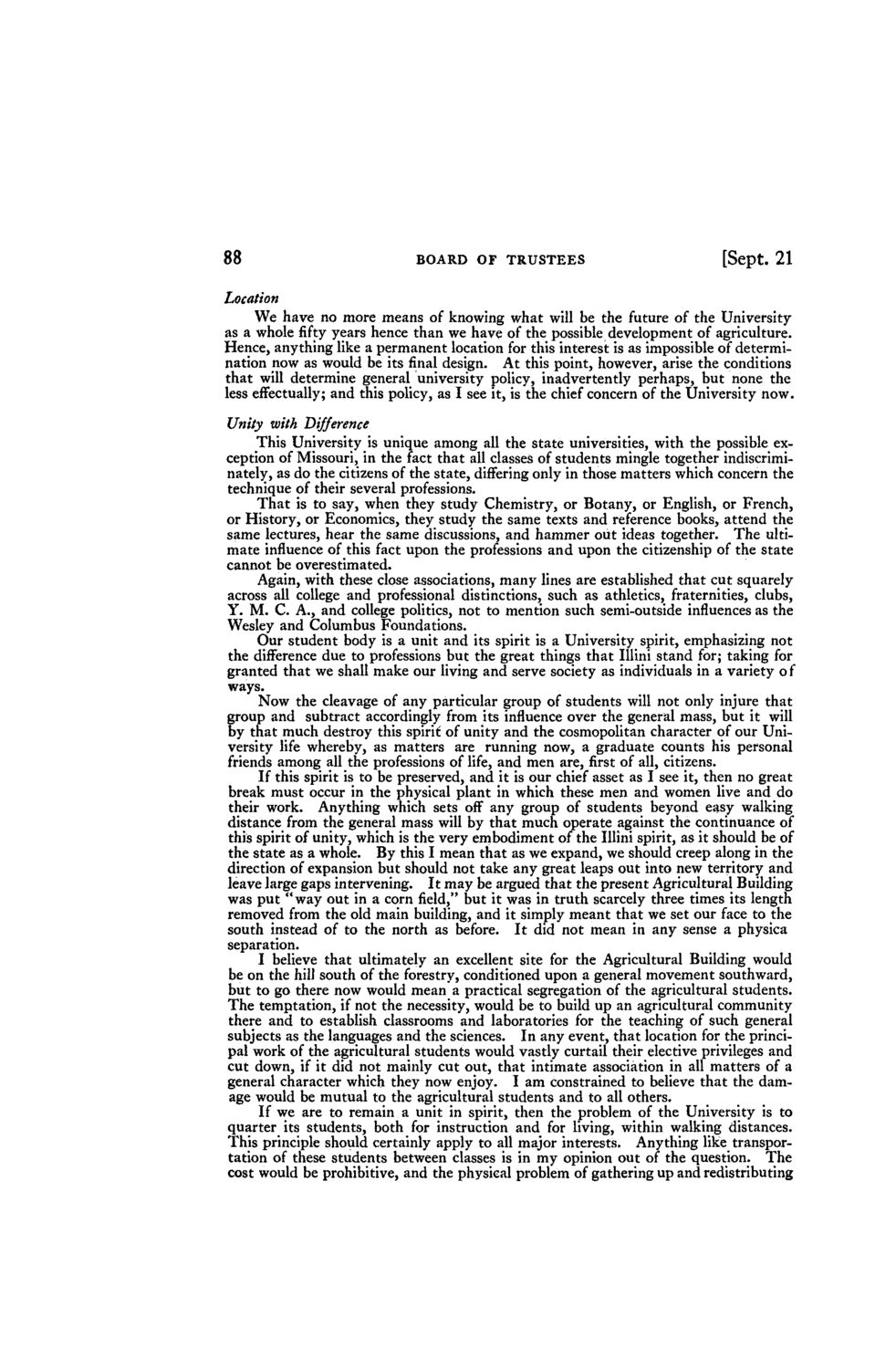| |
| |
Caption: Board of Trustees Minutes - 1922
This is a reduced-resolution page image for fast online browsing.

EXTRACTED TEXT FROM PAGE:
88 BOARD OF TRUSTEES [Sept. 21 Location We have no more means of knowing what will be the future of the University as a whole fifty years hence than we have of the possible development of agriculture. Hence, anything like a permanent location for this interest is as impossible of determination now as would be its final design. At this point, however, arise the conditions that will determine general university policy, inadvertently perhaps, but none the less effectually; and this policy, as I see it, is the chief concern of the University now. Unity with Difference This University is unique among all the state universities, with the possible exception of Missouri, in the fact that all classes of students mingle together indiscriminately, as do the citizens of the state, differing only in those matters which concern the technique of their several professions. That is to say, when they study Chemistry, or Botany, or English, or French, or History, or Economics, they study the same texts and reference books, attend the same lectures, hear the same discussions, and hammer out ideas together. The ultimate influence of this fact upon the professions and upon the citizenship of the state cannot be overestimated. Again, with these close associations, many lines are established that cut squarely across all college and professional distinctions, such as athletics, fraternities, clubs, Y. M. C. A., and college politics, not to mention such semi-outside influences as the Wesley and Columbus Foundations. Our student body is a unit and its spirit is a University spirit, emphasizing not the difference due to professions but the great things that Illini stand for; taking for granted that we shall make our living and serve society as individuals in a variety o f ways. Now the cleavage of any particular group of students will not only injure that group and subtract accordingly from its influence over the general mass, but it will by that much destroy this spirit' of unity and the cosmopolitan character of our University life whereby, as matters are running now, a graduate counts his personal friends among all the professions of life, and men are, first of all, citizens. If this spirit is to be preserved, and it is our chief asset as I see it, then no great break must occur in the physical plant in which these men and women live and do their work. Anything which sets off any group of students beyond easy walking distance from the general mass will by that much operate against the continuance of this spirit of unity, which is the very embodiment of the Illini spirit, as it should be of the state as a whole. By this I mean that as we expand, we should creep along in the direction of expansion but should not take any great leaps out into new territory and leave large gaps intervening. It may be argued that the present Agricultural Building was put " way out in a corn field," but it was in truth scarcely three times its length removed from the old main building, and it simply meant that we set our face to the south instead of to the north as before. It did not mean in any sense a physica separation. I believe that ultimately an excellent site for the Agricultural Building would be on the hill south of the forestry, conditioned upon a general movement southward, but to go there now would mean a practical segregation of the agricultural students. The temptation, if not the necessity, would be to build up an agricultural community there and to establish classrooms and laboratories for the teaching of such general subjects as the languages and the sciences. In any event, that location for the principal work of the agricultural students would vastly curtail their elective privileges and cut down, if it did not mainly cut out, that intimate association in all matters of a general character which they now enjoy. I am constrained to believe that the damage would be mutual to the agricultural students and to all others. If we are to remain a unit in spirit, then the problem of the University is to quarter its students, both for instruction and for living, within walking distances. This principle should certainly apply to all major interests. Anything like transportation of these students between classes is in my opinion out of the question. The cost would be prohibitive, and the physical problem of gathering up and redistributing
| |